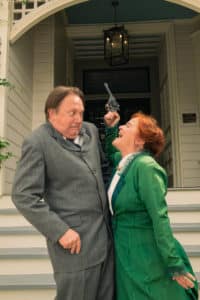Why Resolving Hedda?

We chose this play as a tribute to Henrik Ibsen, who had completely rewritten the rules of drama with a realism we see in the theatre to this day. From Ibsen forward, challenging assumptions and directly speaking about issues has been considered one of the factors that make a play art rather than entertainment…
…OK, that’s not true.
We chose this play as a tribute to Hedda Gabler, just one of Ibsen’s plays dealing with women both trapped by and rebelling against societal norms. Considered “the female Hamlet”, the role encapsulates…
…well, that’s not true either.
We read it, and we laughed. Hard. We thought you would, too.
As Edith Ann (dated reference) would say: “And that’s the truth. Phbbbt.”
On the (slightly) more serious side, when we first read this play a couple of years ago, we were intrigued by the concept, but set it aside, thinking the characters were mostly too young for us. After reading it again, it occurred to us that the characters of Ibsen’s Hedda Gabbler are now 131 years old. If anything, we’re all too young to be doing these roles!
Then, of course, there is the usual problem of the 3 men/3 women cast ratio. Considering the fact that we rarely have enough men audition even for a single role, how would we cast this play? Given the success of last Spring’s Romantic Fools, where our super-talented, mostly-female cast took on the male roles (and played them as males) why couldn’t that be done with this one, too?
So, we have a cast of 2 men and 4 women, playing the roles of 3 men and 3 women…. This is a comedy, after all, based on a very old melodrama. Gender switching is all part of the fun…
